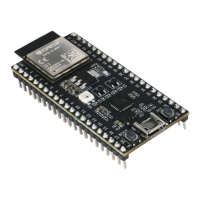Chapter 2. API Reference
Default value:
•“python”
CONFIG_SDK_MAKE_WARN_UNDEFINED_VARIABLES
‘make’warns on undefined variables
Found in: SDK tool configuration
Adds –warn-undefined-variables to MAKEFLAGS. This causes make to print a warning any time an
undefined variable is referenced.
This option helps find places where a variable reference is misspelled or otherwise missing, but it can be
unwanted if you have Makefiles which depend on undefined variables expanding to an empty string.
(Note: this option is used with the legacy GNU Make build system only.)
Default value:
• Yes (enabled)
CONFIG_SDK_TOOLCHAIN_SUPPORTS_TIME_WIDE_64_BITS
Toolchain supports time_t wide 64-bits
Found in: SDK tool configuration
Enable this option in case you have a custom toolchain which supports time_t wide 64-bits. This option
checks time_t is 64-bits and disables ROM time functions to use the time functions from the toolchain
instead. This option allows resolving the Y2K38 problem. See “Setup Linux Toolchain from Scratch”
to build a custom toolchain which supports 64-bits time_t.
Note: ESP-IDF does not currently come with any pre-compiled toolchain that supports 64-bit wide
time_t. This will change in a future major release, but currently 64-bit time_t requires a custom built
toolchain.
Default value:
• No (disabled)
Build type
Contains:
• CONFIG_APP_BUILD_TYPE
CONFIG_APP_BUILD_TYPE
Application build type
Found in: Build type
Select the way the application is built.
By default, the application is built as a binary file in a format compatible with the ESP-IDF bootloader.
In addition to this application, 2nd stage bootloader is also built. Application and bootloader binaries
can be written into flash and loaded/executed from there.
Another option, useful for only very small and limited applications, is to only link the .elf file of the
application, such that it can be loaded directly into RAM over JTAG. Note that since IRAM and DRAM
sizes are very limited, it is not possible to build any complex application this way. However for kinds of
testing and debugging, this option may provide faster iterations, since the application does not need to
be written into flash. Note that at the moment, ESP-IDF does not contain all the startup code required
to initialize the CPUs and ROM memory (data/bss). Therefore it is necessary to execute a bit of ROM
code prior to executing the application. A gdbinit file may look as follows (for ESP32):
Espressif Systems 1060
Submit Document Feedback
Release v4.4

